Diagnosed with Multiple Sclerosis at only 26: Q&A with Kane Pope
28-year-old Kane Pope was working a full-time job, had just bought his dream car, and was enjoying life on the Gold Coast with his girlfriend. In February 2018, his world turned upside down when he was diagnosed with Multiple Sclerosis. The life he knew changed forever.
He experienced depression, struggled financially, and lost a lot of friends in the process. With the support of his girlfriend and an optimistic attitude, Kane has now come to terms with his new normal. I spoke to him about his experience, learning how uncommon it is for a young man to be diagnosed with MS.
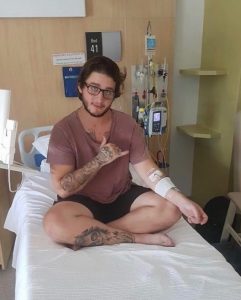
Q: How did you find out that you had Multiple Sclerosis?
A: I lost sight in my right eye and couldn’t see. I thought my eyes were playing up. As the days went on, it progressed to numbness down the right side of my body. From there I thought, “Okay, maybe I need to go check this out then”. I went to the doctors. They weren’t too sure what was going on, and kept referring me to the optometrist. I went to the optometrist who gave me suggestions for what I should do. Went back to the doctors, booked an MRI. I had one and that’s when they found little plaques on my brain. I went to hospital for three days with steroids pumping through me. I had to wait for the neurologist to come see me and then I was diagnosed with MS.
Q: Did you know what MS was?
A: No, I knew nothing about it. Everyone just assumed I had a stroke because of the numbness down the right side of my body. I was just relieved it wasn’t a brain tumour.
Q: How did it affect your life at the time when you found out?
A: I pretty much lost everything. I couldn’t work. I lost my dream car.
I lost everything that I spent years trying to build up and get my life together.
It took a while to start feeling like myself again. I was working [as a painter] for six weeks prior to being diagnosed – I had all the symptoms, I just didn’t know what they were. By the time I was diagnosed, I had surrendered my car and given it back, then it all just started from that. It took me a year after being diagnosed to start my infusions. I would still have days where I’d have blurriness, tingling and numbness down certain parts of my body – stuff like that. I couldn’t work and I tried for Centrelink but they wouldn’t accept me for some reason. I was going to hospital appointments, optometrists, MRI’s. I was doing everything that the hospital wanted me to do.
Q: What’s the treatment like?
A: It’s awesome. I go to the hospital once a month and sit there for an hour and a half and get Tysabri [the infusion treatment] pumped through me. It keeps me going for another four weeks. Two or three days before my next infusion, my body just feels run down and is just ready for the next one.
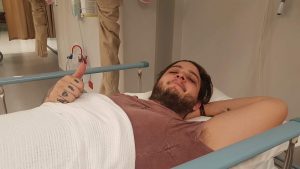
Q: How long do you have to go to treatment for?
A: Once a month for the rest of my life.
Q: Is it common for young men to get MS?
A: It’s much more common in women. Females are more likely to get it, and people in colder climates are more prone to it. They also say it can come from traumatic experiences – which puts strain on the brain and can cause MS down the track. It’s always interesting going to the hospital because there’s always old people there. They ask what I’m there for, assuming it’s an infusion. I’m like, “No, I’m here for my MS.” They’re always like “Really? You? So young!” Then they start taking pity like, “I’m so sorry to hear”.
I haven’t met anyone my age in [the treatment rooms] yet, or even seen a male.
It’s always ladies. Apparently, more men are being diagnosed with MS these days. There’s still a higher female to male ratio. From talking to the old ladies about when they were first diagnosed, I realised how far MS has come. One lady told me she had to wait twenty-one years before she was actually diagnosed with MS. The doctors just kept saying she was a bored, crazy, stay at home wife. She was a 71-year-old. Took them twenty-one years to diagnose her with MS. It made me feel very lucky.
Q: Is it hereditary?
A: No, it’s not. That’s the weird thing about it. You don’t inherit it from anyone in your family. It’s just something that you might get.
Q: Has having MS restricted you from doing normal things?
A: Not physically, more mentally. When I was first diagnosed, there were days where I had to force myself to get out of bed. I get body aches but I just push through that. I don’t give my body the chance to struggle.
Q: How does it affect your day-to-day life?
A: It doesn’t affect my day-to-day, but if my days aren’t going too well – like I’m miserable and not doing much – it’s got a downside of depression. I could have a down day but it could just be that much worse because of everything else that is going on. But, I’m back to feeling like myself. If it wasn’t for going to the hospital once a month, I wouldn’t even know I had MS. I’ve only had one slip-up which was February this year where I had to get another MRI. They found some new plaques and I had to get back on steroids which resolved it pretty much instantly. The doctors said that the cause of it was stress. I had a lot going on. I had to go to court, my brother was having mental health issues, my family was affected by the bushfires.
Stress takes a massive toll on the brain. I try and stay positive as hard as it is sometimes.
Q: Do you have a good support system?
A: Everyone in my family has just been amazing and helpful, always reaching out and checking how I’m going. None of them backed off when they found out I had MS.
A big thing for me was that people thought I was contagious. I lost so many friends because they just backed off from me.
I thought, “I’m not chasing up on that”. Did they think they were going to catch it from me?
My girlfriend, Kyla is my number one supporter. She takes me to all my appointments and takes days off work. She has done everything and anything to help me out.
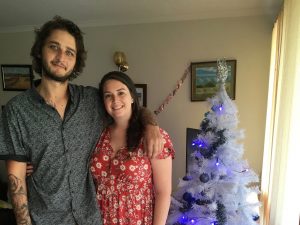
This article touches on topics that may distress some readers. If you or anyone you know needs support, you can contact Beyond Blue on 1300 22 46 36 or Lifeline on 13 11 14.
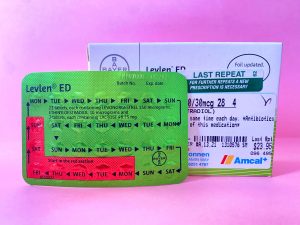
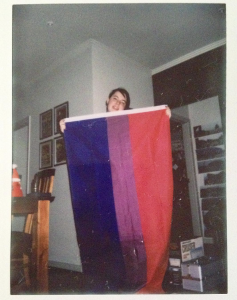



Be the first to comment!